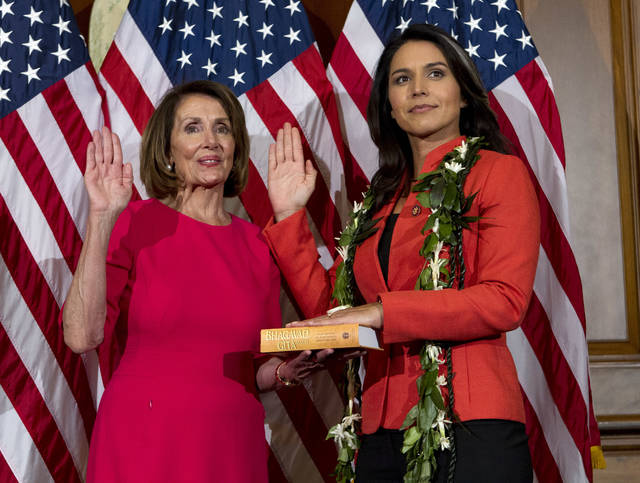Gabbard accuses Hirono, Democratic colleagues of religious bigotry

ASSOCIATED PRESS
House Speaker Nancy Pelosi of Calif., administers the House oath of office to Rep. Tulsi Gabbard, D-Hawaii, during a ceremonial swearing-in on Capitol Hill in Washington, last week, during the opening session of the 116th Congress.
Congresswoman Tulsi Gabbard took aim at Democratic colleagues, including U.S. Sen. Mazie Hirono, accusing them of religious bigotry in their questioning of Brian Buescher, a nominee to the U.S. District Court of Nebraska, in an opinion piece Opens in a new tab published by The Hill yesterday.
Such a schism in Hawaii’s Democratic congressional delegation is highly unusual. Hirono’s office wasn’t told of the piece before it ran. In a statement issued today, Hirono called Gabbard’s opinion misguided and suggested it was influenced by arguments advanced by “right-wing ideologues.”
“Senator Hirono, asks all judicial nominees – particularly those who have expressed very strong personal ideological views in conflict with Supreme Court precedent – if they can be fair. She asked Mr. Buescher, who has a clear record of anti-choice activism, whether or not he could separate his personal beliefs from decisions he would make if confirmed for a lifetime appointment on the federal bench,” said Will Dempster, a spokesman for Hirono, in a statement. “Over the past two years, the senator has been attacked by right wing ideologues for her examination of Donald Trump’s ideologically-driven nominees to the courts. It is unfortunate that Congresswoman Gabbard based her misguided opinion on the far-right wing manipulation of these straightforward questions.”
Gabbard’s opinion piece argues that for years “politicians have weaponized religion for their own selfish gain, fomenting bigotry, fears and suspicious based on the faith, religion or spiritual practices of their potential opponents.”
The congresswoman later zeroes in on the recent questioning of Buescher, without mentioning Hirono by name. Both Hirono and Sen. Kamala Harris (D-Calif.) had questioned Buescher last month about whether he could rule impartially on issues related to abortion and same-sex marriage, noting that Buescher was a member of the Knights of Columbus, which has taken public stances on both.
“I stand strongly against those who are fomenting religious bigotry, citing as disqualifiers Buescher’s Catholicism and his affiliation with the Knights of Columbus,” wrote Gabbard. “If Buescher is ‘unqualified’ because of his Catholicism and affiliation with the Knights of Columbus, then President John F. Kennedy, and the ‘liberal lion of the Senate’ Ted Kennedy would have been ‘unqualified’ for the same reasons.”
Don't miss out on what's happening!
Stay in touch with breaking news, as it happens, conveniently in your email inbox. It's FREE!
Gabbard goes on to take a swipe at U.S. Sen. Dianne Feinstein (D-Calif.) who questioned Amy Coney Barrett during her confirmation hearings in 2017 to serve as U.S. Circuit Court judge in the 7th Circuit.
”Elected leaders engaging in religion-baiting are playing with fire. They are sacrificing the well-being, peace and harmony of our country to satisfy their own political ambitions for partisan political interests,” wrote Gabbard. “We must stand together, call out and reject religious bigotry no matter where it comes from, and fight to protect the freedoms and principles that bind us together as Americans.”
Gabbard’s criticism was praised in an opinion piece Opens in a new tab by the Washington Examiner Opens in a new tab, a right-leaning publication.
But Colin Moore, director of the Public Policy Center at UH Manoa, called it “really shocking,” in an interview with Hawaii News Now. He also opined that Gabbard could be trying to assert her independence as she considers a presidential run.
A spokeswoman for Gabbard said in a statement that the congresswoman would always oppose religious bigotry: “Congresswoman Tulsi Gabbard respects Senator Mazie Hirono, but we must always remember that freedom of religion is enshrined in our Constitution and in our Bill of Rights, which so many brave Americans across generations have put their lives on the line to protect. No nominee for public service should be disqualified, either directly or indirectly because of their religion or religious affiliation. She will always fight for religious freedom and oppose religious bigotry — no matter where it comes from or to whom it’s directed, be they Christians, Buddhists, Muslims, Hindus, or atheists.”



